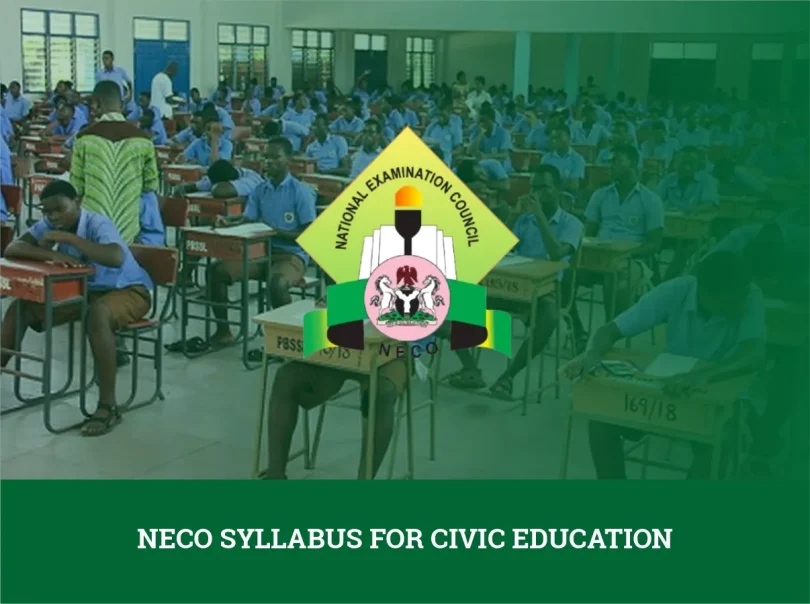NECO (National Examinations Council) has published the official Civic Education syllabus to help candidates prepare effectively for their examinations. The NECO Syllabus for Civic Education clearly outlines all the important topics and learning objectives that candidates are expected to understand.
Using this syllabus as a guide ensures that students focus on the right areas during their revision, making their study time more productive and goal-oriented.
If civic education is one of the subjects you are writing in the June/July NECO examinations, read on to see the full NECO Syllabus for Civic Education and other details that will help you ace the examinations.
NECO Syllabus For Civic Education
Candidates are advised to use this syllabus as a guide to prepare for their examinations.
1. Values
- Understand the meaning of values
- Identify different types of values
- Learn the importance of values to society
2. Citizenship and Nationalism
- Meaning of citizenship
- Meaning and goals of citizenship education
- Duties and obligations of citizens
- Meaning of nationalism
- Ways to promote national consciousness, integrity, and unity
- Nationalistic roles of individuals and groups
- Identify civic problems locally and globally
3. Human Rights
- Meaning and categories of human rights
- Characteristics of human rights
- Understand the Universal Declaration of Human Rights (UDHR): its meaning and history
- Identify the seven core freedoms in the UDHR
- Importance of UDHR
- Roles of individuals, groups, and government in promoting UDHR
- Know the limitations to exercising human rights
4. Law and Order
- Definition and features of law and order
- Importance of law and order in society
- Meaning and types of constituted authority
- Roles and importance of constituted authority
5. Responsible Parenthood
- Meaning of responsible parenthood
- Roles of responsible parents
- Importance of responsible parenting in national development
6. Traffic Regulations
- Meaning of traffic regulations
- Importance of traffic rules in society
- Roles of individuals and government in maintaining traffic rules
7. Interpersonal Relationships
- Meaning and types of interpersonal relationships
- Skills that promote good relationships
- Understand inter-communal relationships and their importance
- Meaning and causes of inter-communal conflicts
- Skills for resolving such conflicts
8. Cultism
- Meaning and origin of cultism
- Different cult groups and their symbols in Nigeria
- Reasons people join cults
- Consequences of cultism
- Ways to prevent cultism in society
9. Drugs and Drug Abuse
- Meaning of drug abuse
- Types of drugs that can be abused
- How drugs are abused and their symptoms
- Behaviour of drug addicts
- Ways to prevent drug abuse
- Government agencies fighting drug abuse and what they do
- Laws against drug abuse
10. Human Trafficking
- Meaning of human trafficking
- Causes and effects of human trafficking
- What government and individuals are doing to stop it
11. HIV/AIDS
- Meaning, causes, and symptoms of HIV/AIDS
- Effects and how to prevent it
- Avoiding the stigmatization of people living with HIV/AIDS
12. Youth Empowerment
- Meaning of youth empowerment
- Different youth empowerment skills
- Importance and benefits of these skills
- Government efforts in supporting youth empowerment
13. Structure and Functions of Government
- Meaning of government
- Structure or tiers of government (federal, state, local)
- Functions of government
14. Democracy, Rule of Law, and National Development
- Meaning, types, and features of democracy
- Importance and challenges of democracy
- Pillars of democracy
- Meaning and features of rule of law
- Importance and challenges of the rule of law
- Meaning of national development
- How democracy and rule of law promote national development (good governance, job creation, poverty reduction, etc.)
15. Political Apathy
- Meaning, causes, and consequences of political apathy
- Why leaders sometimes fail their followers
- How leaders can protect the interests of the people
- Ways to reduce political apathy in society
16. Civil Society and Popular Participation
- Meaning and types of popular participation
- Importance of public involvement in society
- Traditional and modern ways of participating in politics
- How to improve public participation
- Meaning of civil society
- Functions and importance of civil society
- Qualities like fairness, justice, and accountability
- Problems civil society faces (e.g., corruption, low funding, foreign influence)
17. Public Service in Democracy
- Meaning and functions of public service
- Problems faced by public service
- Reasons for these shortcomings
- Ways to improve public service
Candidates are strongly advised to take this Civic Education syllabus seriously as they prepare for their NECO examination. In addition to studying the topics outlined, you should also look for past questions on Civic Education and use them to revise alongside your textbooks and notes. This will help you understand how questions are usually set and how best to answer them.
If you have any questions or need clarification on any part of the syllabus, feel free to ask in the comments, and we will respond as soon as possible.
Don’t forget to share this page with other candidates. We have the complete syllabi for all NECO subjects and other important examinations.







Leave a Comment